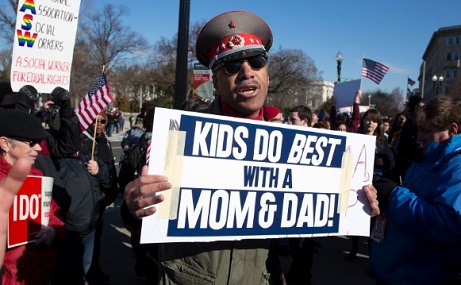 Last Friday, in a long-sought victory for the gay rights movement, the Supreme Court ruled by a 5-to-4 vote that the Constitution guarantees Americans the right to marry members of the same gender. Yet, why did four Supreme Court Justices disagree?
Last Friday, in a long-sought victory for the gay rights movement, the Supreme Court ruled by a 5-to-4 vote that the Constitution guarantees Americans the right to marry members of the same gender. Yet, why did four Supreme Court Justices disagree?
Justices Anthony Kennedy, Ruth Bader Ginsburg, Stephen G. Breyer, Sonia Sotomayor and Elena Kagan were among the majority, but each member of the court’s conservative wing offered a separate dissent in the decision, including Chief Justice John G. Roberts, Jr.
While many have suggested that the Justices have interpreted the U.S. Constitution as grounds for marriage equality, Roberts claimed that the Constitution had nothing to do with the issue.
“If you are among the many Americans — of whatever sexual orientation — who favor expanding same-sex marriage, by all means celebrate today’s decision,” Chief Justice Roberts wrote. “Celebrate the achievement of a desired goal. Celebrate the opportunity for a new expression of commitment to a partner. Celebrate the availability of new benefits. But do not celebrate the Constitution. It had nothing to do with it.”
Roberts also claimed that the majority opinion was “an act of will, not legal judgment.”
Justice Antonin Scalia derided Justice Kennedy, who has become the nation’s most vocal judicial advocate of gay rights.
“The opinion is couched in a style that is as pretentious as its content is egotistic,” Justice Scalia wrote of his colleague’s work. “Of course the opinion’s showy profundities are often profoundly incoherent.”
Justice Clarence Thomas was also a part of the dissenters.
With only 11 states and the District of Columbia having embraced the right to same-sex marriage democratically, at voting booths and in legislatures, Roberts wrote in a very flagrant tone that the decision was an arrogant one, disregarding the rights of the remaining states.
“The court invalidates the marriage laws of more than half the states and orders the transformation of a social institution that has formed the basis of human society for millennia, for the Kalahari Bushmen and the Han Chinese, the Carthaginians and the Aztecs,” he wrote. “Just who do we think we are?”
The dramatic shift in public opinion, and now in the nation’s laws, has left evangelical Protestants, who make up about a quarter of the American population, in a very precarious position.
Michelle Gray-Pinder, a youth minister who attended the Forward Conference in Duluth, Georgia this past weekend, claimed conference organizer Pastor Jentezen Franklin addressed the 13,000-person auditorium after the news was released.
“He talked to us about how this is the sign of the times and how our country has just changed the fabric of society. It is our responsibility to stand up,” said Gray-Pinder.
Now deemed unfashionable and out of sync with the broader society, people like Franklin and Gray-Pinder may soon be ridiculed for their deeply held belief that homosexuality is not God’s plan.
Justice Kennedy chose to address this group be citing the First Amendment: “[it]ensures that religious organizations and persons are given proper protection as they seek to teach the principles that are so fulfilling and so central to their lives and faiths.”
He said both sides should engage in “an open and searching debate.”
 Chief Justice Roberts responded that “people of faith can take no comfort in the treatment they receive from the majority today.”
Chief Justice Roberts responded that “people of faith can take no comfort in the treatment they receive from the majority today.”
Justice Samuel A. Alito Jr., in his dissent, claimed that last Friday’s decision could be used to discriminate against members of the religious community and others who don’t agree.
“It will be used to vilify Americans who are unwilling to assent to the new orthodoxy,” Justice Alito wrote. “In the course of its opinion, the majority compares traditional marriage laws to laws that denied equal treatment for African-Americans and women. The implications of this analogy will be exploited by those who are determined to stamp out every vestige of dissent.”
In his own dissent, Justice Scalia said that the majority’s assertiveness represented a “threat to American democracy.”

